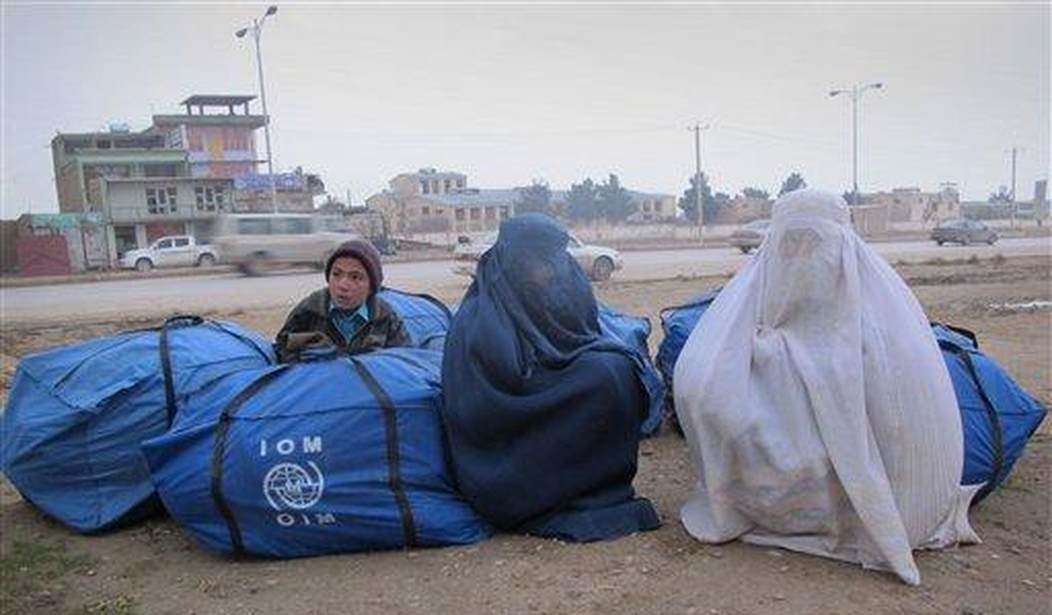Reuters reported Tuesday that at least one global authority is already reconciling itself to Taliban rule in Afghanistan: “The chief of field operations of the U.N. children’s agency expressed cautious optimism about working with Taliban officials following their seizure of power in Afghanistan, citing their early expressions of support for girls’ education.” The source of this optimism may have been Taliban spokesman Zabiullah Mujahid sounding a superficially reassuring note: “We are going to allow women to work and study, women are going to be very active in society… we guarantee all their rights within the limits of Islam.”
That’s a relief, right? Everyone, including Afghan women, is expecting the Taliban to act swiftly and ruthlessly to oppress women, but if Zabiullah Mujahid is on the level about respecting women’s rights within the limits of Islam, how bad could it be? After all, everyone tells us that it’s a religion of peace and tolerance, right? Still, instead of just breathing a sigh of relief at Zabiullah’s words and assuming that all will now be well for women in Afghanistan, it would behoove Westerners to familiarize themselves with what those “limits of Islam” actually are — that is, what Islamic texts say about women, as opposed to what Western non-Muslim spokesmen wish they said.
The record of those Islamic texts, unfortunately, is not as benign as the UN children’s agency might assume. The Qur’an teaches that men are superior to women and should beat those from whom they “fear disobedience”: “Men have authority over women because Allah has made the one superior to the other, and because they spend their wealth to maintain them. Good women are obedient. They guard their unseen parts because Allah has guarded them. As for those from whom you fear disobedience, admonish them and send them to beds apart and beat them” (4:34).
The Qur’an likens a woman to a field (tilth), to be used by a man as he wills: “Your women are a tilth for you, so go to your tilth as you will” (2:223).
It declares that a woman’s testimony is worth half that of a man: “Get two witnesses, out of your own men, and if there are not two men, then a man and two women, such as you choose, for witnesses, so that if one of them errs, the other can remind her” (2:282).
The Islamic holy book also allows men to marry up to four wives, and have sex with slave girls: “If you fear that you shall not be able to deal justly with the orphans, marry women of your choice, two or three or four; but if you fear that you shall not be able to deal justly, then only one, or one that your right hands possess, that will be more suitable, to prevent you from doing injustice” (4:3).
It rules that a son’s inheritance should be twice the size of that of a daughter: “Allah directs you as regards your children’s inheritance: to the male, a portion equal to that of two females” (4:11).
It allows for marriage to pre-pubescent girls, stipulating that Islamic divorce procedures “shall apply to those who have not yet menstruated” (65:4).
What’s more, a Muslim wife may not refuse sex. A hadith depicts Muhammad saying: “If a husband calls his wife to his bed [i.e. to have sexual relation] and she refuses and causes him to sleep in anger, the angels will curse her till morning” (Bukhari 4.54.460).
And: “By him in whose hand lies my life, a woman can not carry out the right of her Lord, till she carries out the right of her husband. And if he asks her to surrender herself [to him for sexual intercourse] she should not refuse him even if she is on a camel’s saddle” (Ibn Majah 1854).
The Taliban’s restrictions of women’s movements also have an Islamic basis. Islamic law stipulates: “The husband may forbid his wife to leave the home…because of the hadith related by Bayhaqi that the Prophet…said, ‘It is not permissible for a woman who believes in Allah and the Last Day to allow someone into her husband’s house if he is opposed, or to go out of it if he is averse’” (Reliance of the Traveller m10.4).
And what about those burqas, with which Afghan women have come to be associated all over the world? The Qur’an says: “O Prophet, tell your wives and your daughters and the women of the believers to bring down over themselves of their outer garments. That is more suitable that they will be known and not be abused. And ever is Allah Forgiving and Merciful.” (33:59) The implication there is that if women do not cover themselves adequately with their outer garments, they may be abused, and that such abuse would be justified.
In light of all this, Zabiullah Mujahid’s words are hardly reassuring. And the UN children’s agency, as well as the rest of the world, should know this. But wishful thinking and political correctness are so much easier than facing unpleasant realities.
Related: Epitaph for Afghanistan Women: ‘No One Cares About Us’










Join the conversation as a VIP Member